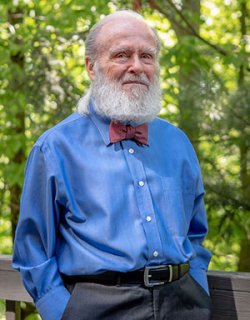Professor Emeritus
Education
Professor Emeritus Robert Pines joined Montclair State in 1970 as an assistant professor of education in what was then the Department of Curriculum and Teaching in the College of Education and Human Services. Known for his quiet and encouraging manner, Pines taught, mentored and inspired hundreds of students during his 33 years at Montclair State.
“Dr. Pines is an amazing man,” says Alex Kaplanovich ’73, ’92 MA, who, along with his wife, Veronica Kaplanovich ’82, was a student of Pines. “Although he may be very soft spoken and quiet, the message he conveys to his students is very powerful. As our professor, he inspired both of us to enter our teaching profession with a positive attitude and to go out and make a difference.”

Pines’ goal in the classroom was to create a setting for learning that encouraged the exploration of ideas and the discovery of personal meanings. “I urged students preparing to teach to examine how their particular constellations of knowledge, interests and motivations could be marshaled in the classroom,” he says.
His approach was a perfect fit for many of his students including Marty Siegel ’90, ’99 MA. “[Dr. Pines] had an uncanny ability to encourage me to reflect on the quality of my instructional practices,” Siegel recalls. “This eventually became an integral part of the way I prepared lessons for my students. I will always be grateful to him for helping to forge the way I taught.”
Named an associate professor in 1977 and a full professor in 1985, Pines became the director of Teacher Education in 1986 and remained in that administrative role for nine years before returning to teaching in 1995.
“The important lesson that I learned from Dr. Pines is that a teacher must always use a humanistic, student-centered approach in the classroom,” says Linda Hendrixson ’79 PhD, who is now retired from teaching at East Stroudsburg University. “Respect the student’s viewpoint and approach the teacher-student relationship as a mutually shared experience.”
The author or co-author of numerous journal articles and papers on teacher education and related topics, Pines served on or chaired many education-related committees at the state and national levels. He has served in the National Delegate Assembly for the Association of Teacher Educators and as president of the New Jersey Association of Teacher Educators.
Pines retired in 2003 and was named Professor Emeritus the following year but the lessons he taught still are still remembered by his students.
“I felt fortunate as a mature, second-career student to be mentored by Dr. Pines,” says Siegel. “His quiet method of requiring self-reflection about best practice set an exacting educational bar quite high. [His] indelible imprint on my instructional paradigm was not only invaluable to my students and me but also deeply appreciated over the course of my teaching career.”
Both Alex and Veronica Kaplanovich also credit Pines’ lasting influence. “He stressed that every morning when you walk into your school you are making an impression,” Alex says. “We are now retired from the teaching and coaching professions yet we carried his message with us every day.”
